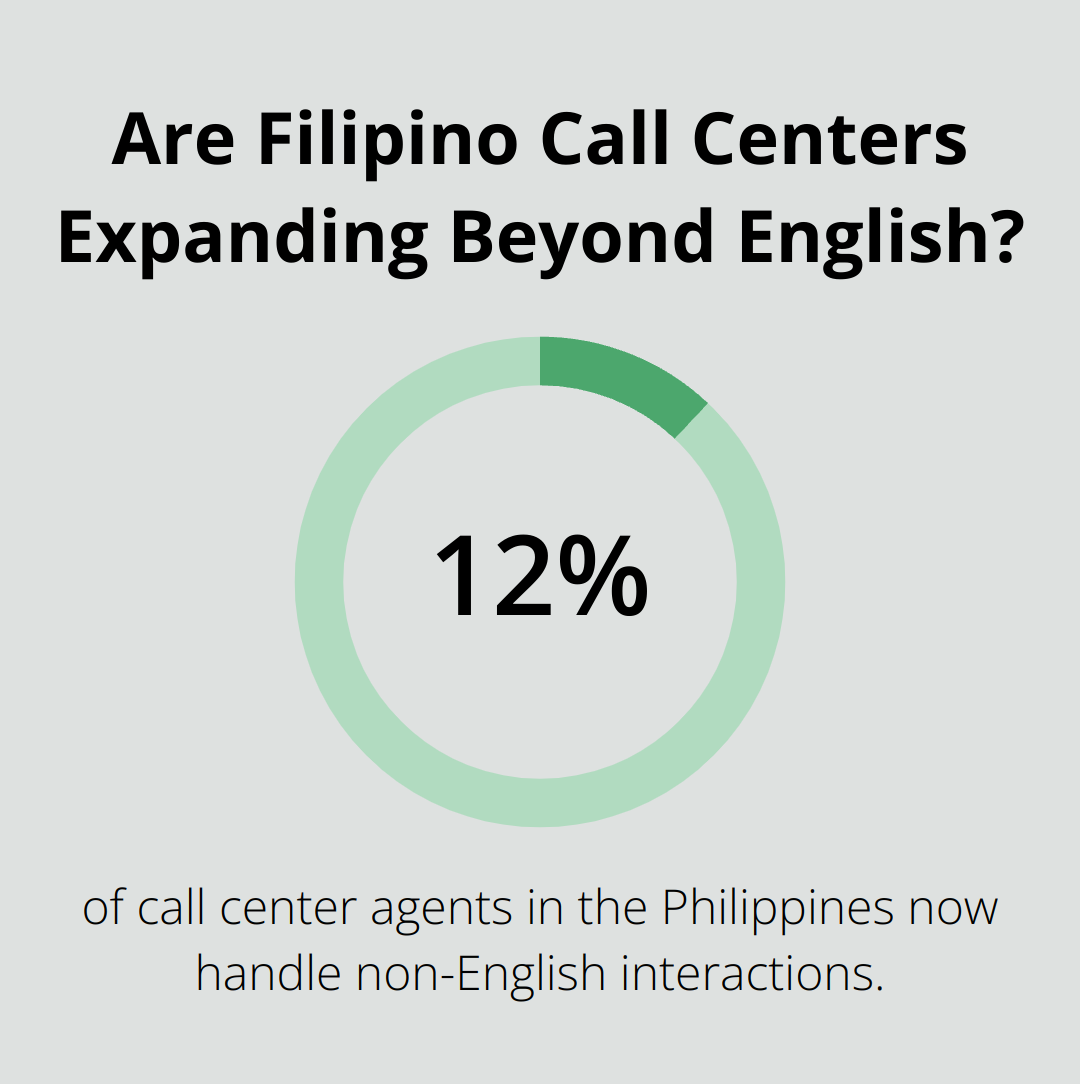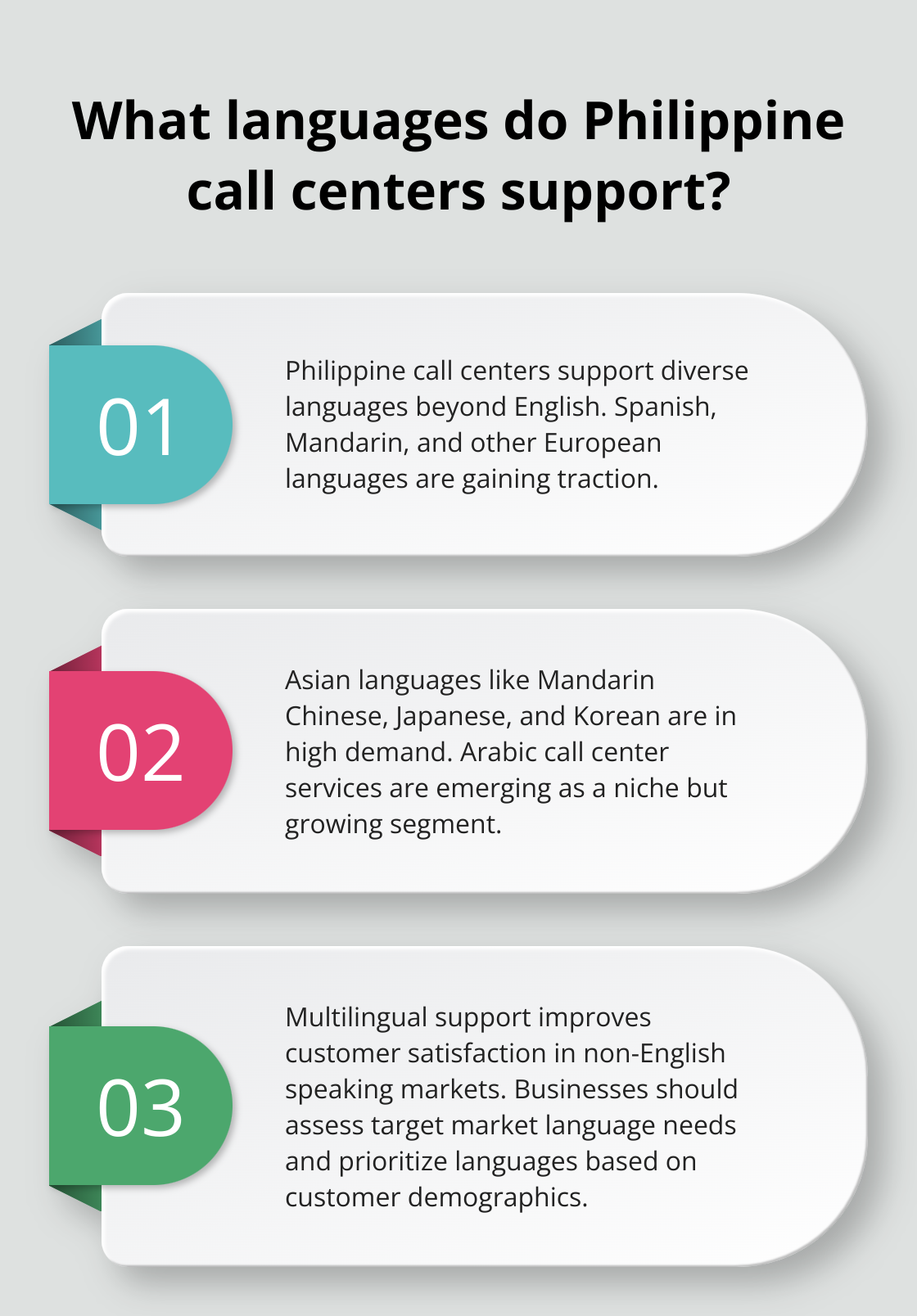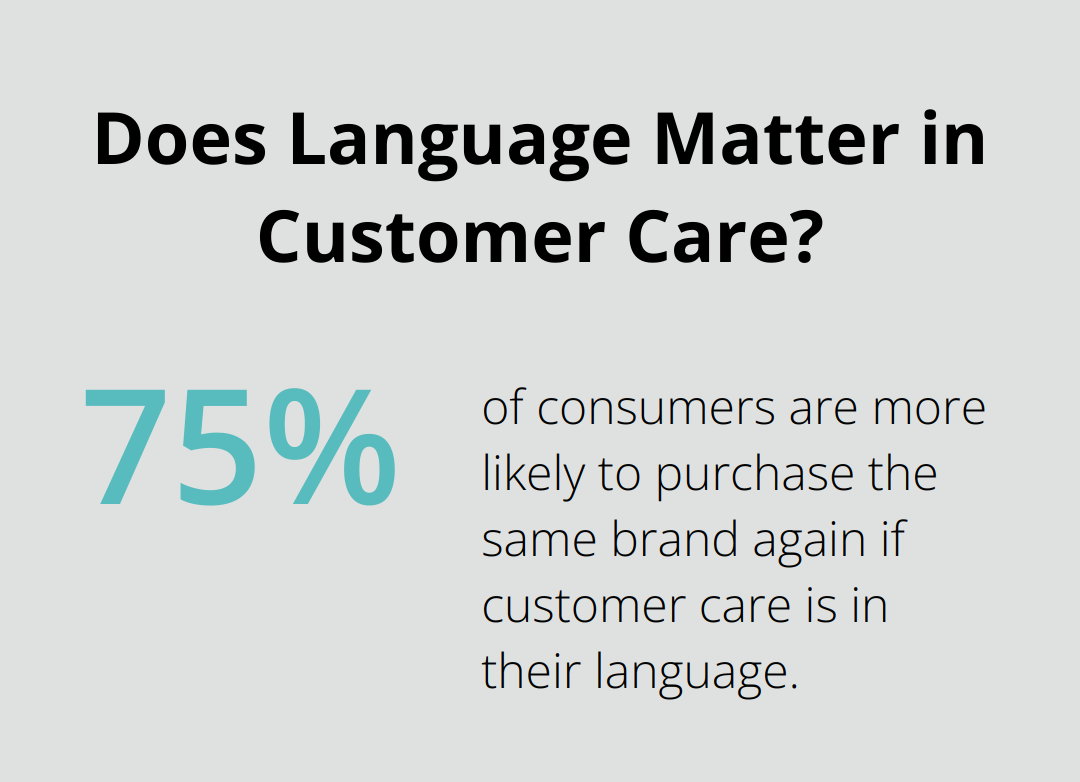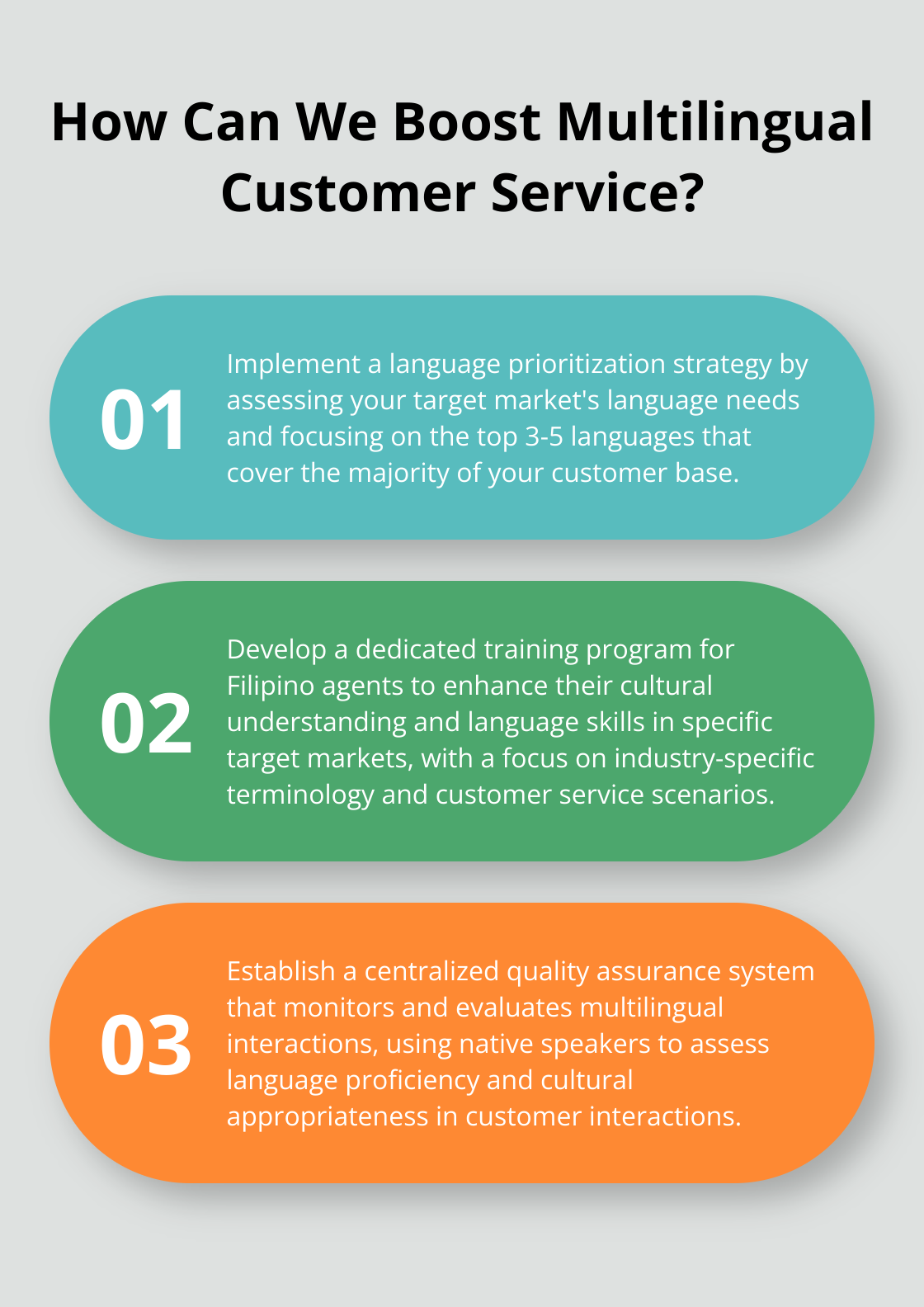The Philippines’ multilingual capabilities have transformed the global call center landscape.
At Outsource Consultants, we’ve witnessed firsthand how this Southeast Asian nation has become a prime destination for multilingual customer support.
With a growing pool of linguistically diverse talent, the Philippines offers businesses a unique edge in serving international markets efficiently and effectively.
Why Is the Philippines a Multilingual Powerhouse?
Unparalleled English Proficiency
The Philippines stands out as a multilingual powerhouse in the global call center industry. This unique advantage stems from several key factors that make Filipino agents exceptionally well-suited for international customer support roles.

English proficiency in the Philippines ranks among the highest in Asia. The EF English Proficiency Index places the Philippines 27th globally and 3rd in Asia for English skills. This high level of proficiency translates directly to call center performance. However, recent research suggests that Filipino English proficiency may be declining due to factors such as learners’ motivation and parental involvement.
Filipino English speakers excel due to their neutral accent. Unlike other outsourcing destinations, customers from various English-speaking countries easily understand Filipino agents. This clarity significantly reduces miscommunication and improves customer satisfaction rates.
✅ Why it matters: Clear, easily understood communication reduces customer frustration and improves CSAT scores.
Expanding Language Capabilities
While English remains the primary language for most call center operations, the Philippines rapidly expands its multilingual capabilities. The IT and Business Process Association of the Philippines (IBPAP) reports that about 12% of call center agents now handle non-English interactions. This growth in language diversity allows businesses to serve a wider range of international markets from a single location.
Spanish deserves particular attention, as many Filipinos quickly pick up the language due to its similarities with Filipino. Other languages gaining traction include Mandarin, Japanese, Korean, and French. This linguistic versatility enables companies to consolidate their customer support operations in the Philippines, which leads to significant cost savings and operational efficiencies.
Cultural Alignment with Western Markets
The Philippines’ historical ties with Western countries (particularly the United States) have fostered a deep understanding of Western culture among Filipinos. This cultural affinity becomes a major asset in customer service interactions. Filipino agents easily relate to and empathize with customers from Western countries, which leads to more natural and effective communication.
This cultural alignment often results in higher customer satisfaction scores compared to other outsourcing destinations. Businesses that leverage Philippine call centers can expect their agents to understand cultural nuances, idioms, and context-specific communication styles, which enhances the overall customer experience.
Technological Adaptability
Filipino call center agents demonstrate remarkable adaptability to new technologies. The country’s BPO industry invests heavily in training programs that focus on the latest customer service technologies and AI-powered tools. This commitment to technological advancement ensures that Filipino agents stay at the forefront of customer service innovation.
This adaptability future-proofs your CX investment, especially if you’re planning to evolve toward AI-human hybrid teams.
Cost-Effective Quality Service
The Philippines offers a unique combination of high-quality service and cost-effectiveness. Businesses can save 40-70% on operational costs compared to maintaining in-house call centers in North America or Europe. This cost advantage doesn’t come at the expense of quality, as Filipino agents consistently deliver top-notch customer service.
As we explore the key languages supported in Philippine call centers, we’ll see how this multilingual edge translates into tangible benefits for businesses seeking to expand their global reach.
Which Languages Do Philippine Call Centers Support?
Philippine call centers have transformed into multilingual hubs, supporting a diverse range of languages beyond English. This linguistic versatility allows businesses to tap into global markets efficiently from a single location.
European Languages
Spanish, Mandarin, and other languages are gaining traction among European languages supported in Philippine call centers. The historical Spanish influence in the Philippines facilitates quick language acquisition for many Filipinos. Other European languages gaining traction include French, German, and Italian. These language capabilities enable businesses to serve customers across Europe without the need for multiple regional centers.
Asian Languages
The proximity to major Asian markets has driven demand for Asian language support in Philippine call centers. Mandarin Chinese tops the list of Asian languages supported. Japanese and Korean are also important languages in this sector. This Asian language support proves particularly valuable for businesses expanding into East Asian markets, where English proficiency may be lower.
-
Mandarin Chinese: High demand from tech and eCommerce.
-
Japanese & Korean: Key for regional brand support in APAC.
Middle Eastern Languages
Arabic call center services are emerging as a niche but growing segment in Philippine call centers. The demand for Arabic support is steadily increasing, stemming from businesses looking to tap into Middle Eastern markets and serve Arabic-speaking communities worldwide.
The ability to support multiple regions from one base gives businesses an operational edge—and reduces time-to-market for global expansion.
Impact on Customer Satisfaction
Businesses that leverage these multilingual capabilities often see an increase in customer satisfaction scores across non-English speaking markets. This improvement results from the ability to provide native language support, which enhances communication clarity and cultural understanding.
Maximizing Multilingual Benefits
To maximize the benefits of multilingual support, businesses should:
- Assess target market language needs
- Prioritize languages based on customer demographics
- Invest in ongoing language training for agents
- Implement quality assurance measures specific to each language

The strategic utilization of multilingual capabilities in Philippine call centers opens doors to new markets and enhances customer experiences across diverse regions. This linguistic versatility sets the stage for exploring the numerous benefits that multilingual Philippine call centers bring to global businesses.
How Multilingual Philippine Call Centers Benefit Global Businesses
Streamlined Global Support
Philippine call centers with multilingual capabilities offer significant advantages for businesses that want to expand their global reach. These benefits extend far beyond simple cost savings and encompass improved customer experiences and operational flexibility.

Multilingual Philippine call centers allow businesses to consolidate their customer support operations in a single location. This consolidation results in substantial cost savings and operational efficiencies. Global brands trust call center outsourcing in the Philippines for cost savings, skilled workforce, and exceptional customer service. This cost advantage doesn’t compromise service quality, as Filipino agents consistently deliver top-notch customer support.
The streamlined approach also simplifies management and oversight. Instead of managing multiple regional centers, businesses can centralize their customer service operations, which ensures consistent quality and brand messaging across all markets. This centralization benefits companies that expand into new international markets, as it allows for rapid scaling of language support without the need to establish new physical locations.
Enhanced Customer Satisfaction
Providing support in a customer’s native language significantly improves satisfaction and loyalty. Studies show that 75% of consumers are more likely to purchase the same brand again if customer care is in their language. This linguistic compatibility leads to more effective problem-solving and stronger customer relationships.
Filipino agents’ cultural affinity with Western markets further enhances the customer experience. Their understanding of cultural nuances and communication styles results in more natural and empathetic interactions. This cultural alignment often translates to higher customer satisfaction scores compared to other outsourcing destinations.
Agile Language Support Scaling
The diverse language capabilities of Philippine call centers offer businesses unparalleled flexibility in scaling their language support. As companies enter new markets or experience seasonal fluctuations in demand, they can quickly adjust their language support without the complexities of hiring and training new staff in multiple locations.
This agility proves particularly valuable in today’s fast-paced global market. Businesses can respond swiftly to emerging opportunities or changing customer demographics by leveraging the existing multilingual talent pool in the Philippines. For instance, if a company sees a sudden increase in Spanish-speaking customers, they can rapidly scale up their Spanish language support without the need for extensive recruitment or training processes.
Businesses that leverage multilingual Philippine call centers can adapt to market changes up to 30% faster than those relying on traditional, monolingual support structures (according to industry estimates). This adaptability provides a significant competitive advantage in rapidly evolving global markets.
Industry estimates show brands using PH-based multilingual support scale 30% faster than those with fragmented regional operations.
Cost-Effective Quality Service
The Philippines offers a unique combination of high-quality service and cost-effectiveness. Businesses can achieve significant savings on operational costs without sacrificing service quality. Filipino agents consistently deliver top-notch customer service, thanks to their strong English proficiency, cultural understanding, and dedication to continuous improvement.
The cost savings extend beyond just labor expenses. By consolidating multilingual support in a single location, businesses can reduce overhead costs associated with maintaining multiple regional centers. This consolidation also streamlines training, quality assurance, and management processes, further enhancing operational efficiency.
Outsourcing multilingual support to the Philippines cuts costs, yes—but it also:
-
Reduces overhead by consolidating teams.
-
Lowers onboarding and training complexity.
-
Delivers better ROI across customer engagement KPIs.
Final Thoughts About Offshore Multilingual Support
The Philippines’ multilingual capabilities have established the country as a global leader in call center services. This linguistic versatility, combined with cultural affinity and cost-effectiveness, creates a powerful advantage for businesses seeking to expand their international reach. Philippine call centers offer support in numerous languages, enabling companies to serve diverse markets from a single location.

The impact of these multilingual services on global business expansion is significant. Companies that leverage Philippine call centers can enter new markets confidently, knowing they have the linguistic and cultural expertise to provide exceptional customer experiences. This ability to scale language support quickly gives businesses a competitive edge in today’s fast-paced global economy.
For businesses aiming to harness these advantages, partnering with experienced advisors can make all the difference. Outsource Consultants specializes in connecting companies with top-tier call center services tailored to their specific needs (including multilingual support). Their expertise in navigating the complexities of global customer service outsourcing ensures that businesses can fully capitalize on the Philippines’ multilingual edge.
FAQs about Multilingual Call Center Support in the Philippines
1. What languages are commonly supported in Philippine call centers?
In addition to English, call centers in the Philippines often support Spanish, Mandarin, Japanese, Korean, French, German, and Arabic—enabling global CX from one site.
2. Why are Filipino agents preferred for Western markets?
Because of the Philippines’ cultural alignment with the U.S. and other Western countries, Filipino agents deliver empathetic, natural communication that enhances customer satisfaction.
3. How do businesses scale language support in the Philippines?
With large, flexible talent pools and multilingual training programs, Philippine call centers can quickly ramp new language teams to meet market demand.
4. Are multilingual call centers in the Philippines cost-effective?
Yes—businesses can save up to 70% compared to in-house teams, without sacrificing quality. Savings stem from lower labor costs, consolidated operations, and scalable infrastructure.
5. How can Outsource Consultants help with multilingual CX?
We connect businesses with pre-vetted multilingual BPOs based on your goals, industry, and target markets—ensuring you get the right support without wasting time or budget.






